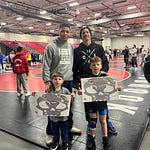🔥Welcome to volume #00072!🔥
I’m Christian Champ. This is ☯️The Middle Way Newsletter ☯️. It is a place where I write, explore, share, and invite you along for the journey.
If you enjoy the newsletter please share it with your friends.
Please follow The Middle Way on Instagram and Twitter.
I’m also currently writing a daily atomic essay here.
🎲How I Learned to Play the Games, I Wanted to Play🎲
While playing an improv show, it hit me that everything in life is a game. The Shakespeare quote "all of life is a stage" flashed on the big screen of my brain. Eureka was happening right then and there.
WE ARE ALWAYS PLAYING GAMES!
The stage is another metaphor for a game, where we play parts, characters, and create rules.
When we open our eyes, we see all the games we play. We begin to count the various scoreboards that fill our days.
We play games for fun, flow, and sometimes money, power, and respect. When we notice all the games we play, we get to recommit to them or reject them.
Here are Four steps for playing the games we want to play.
#1 Remember Everything is a Game
Our job, our relationships, and our day-to-day existence make up the games. They can be serious or trivial games, and we get to decide this!
Recognizing it is all a game takes the pressure off of us. We get to look at life in terms of what we want to accomplish while we play. Does the game lead to an outcome or a journey that we want to embark on?
Little children drive home this point. If you want your kids to do something, define the rules and start the challenge. The first one to get dressed and out the door wins. Let's go!
Create a challenge at the gym or in your office and watch what happens?
Once we realize it's all a game, we move on to ask a critical question.
#2 Realize What Games We Want to Play?
This part takes effort, experiments, and trial and error. What is our north star? How do we want to show up in the world? What gives us joy?
Those answers drive us to the games we want to experiment with to find out what works. We want games that nourish us and help us grow (see infinite games). We want to avoid games that throw us into the wall or put us into dead ends.
I ran into this wall and realized chasing money and titles failed to fill up my cup. I instead shifted my focus to learning and growing with a like-minded community, things I controlled.
We want games where we can decide the outcomes.
#3 Replace the Games We Don't Want to Play
If the game fails to serve us, quit. This step creates a simple fix for most of our issues. We exit the situations, people, and places where the games fail us.
The worst games I found myself trapped in include any form of victim's triangles. In the triangle, we get the victim, the persecutor, and the savior. Any role in this triangle perpetuates the drama and fails to serve the players.
When exiting the situation isn't an option, we move on to the next step in the process.
#4 Reframe the Games We Have to Play
We can't fire our children, relatives, or potentially our job. In those cases, we reframe the games we need to play. We open ourselves to new ideas and views while changing how we play them.
The easy hack here is avoiding hot button subjects, experimenting with new approaches and at all costs avoiding falling into old, failed patterns. I avoid talking about politics, religion, or other hot-button topics with folks that lead to bad moments (or maybe just all folks 😁).
The old me liked to double down and embark on a frivolous discussion. The ending was a meal where everyone got food poisoning.
The current me plays ping-pong where we hit the ball back and forth and enjoy each other's company. No one tries to spike on each other, and if they do, we just let them score the point.
These four steps give us a blueprint for moving in the direction of how we want to experience life.
Remembering, Realizing, Replacing, and Reframing is the protocol for the games we want to play.
📓Things to Think About📓
Khe Hy writes about Unlearning
This topic mixes well with picking the games we play. Khe asked readers, what do you want to unlearn? This term unlearn is centered around what do you want to remove from your life (like bad games)?
Here was his responses.
As your fearless leader, I went first with my list of unlearnings:
For something to be worthwhile, it has to be hard
The natural path of marriage is growing closer
Feeling of “on top of things” is possible
It’s too late to salvage strained relationships
Here is where the majority of his reader’s responses fell into.
I organized the reader responses into four categories:
Funny
Work, Productivity and Decision-making
How you view yourself
How you relate to others
Like Khe asked, what do you want to unlearn?
For me its
Losing focus on the process to worry about the outcome
Be ok not getting everything done
Needing people to get there quickly or maybe moving on
Not recording my learnings
Friend of the Newsletter, Mawi Asgeedom on the Genocide in Tigray
Mawi asks for help as the outlook worsens in Ethiopia and nothing is being done to stop the atrocities.
But in Ethiopia we have a proverb, “The rod of truth may bend, but it will never break.” Journalists and aid workers risked their lives to share harrowing accounts of war crimes across Tigray by Ethiopian and Eritrean forces: hundreds of civilians slaughtered outside a church in Ethiopia’s holy city of Axum, their rotting carcasses reportedly left for hyenas; dozens of civilians bombed by Ethiopian warplanes at a crowded marketplace in Togoga; mass murders across Western Tigray that Secretary of State Antony Blinken later referred to as acts of “ethnic cleansing.
Chris Arnade is walking around the US and writing about it
There is nothing better than walking around a neighborhood (minus riding a bike perhaps). You feel the soul of the place and the soul of the people. Life slows down and the feeling of “real” permeates your journey. The transactional nature that we find ourselves trapped in fades away. We connect with others versus flying past in a car.
Chris is feeling those feels as he walks through towns in the US.
Because the residents of Holyoke, like in any “run down town”, continue living and doing their best despite them. Seeing that, and being reminded of that, is why I walk.
People build the best lives they can, with what is available. They do the best to lift themselves above the mundane, no matter their surroundings. In Holyoke they do that in spades, made easier by the natural and architectural beauty of the town.
There are plenty of examples of that, but it is the smaller examples that strike me the most. The slightly run-down house, its porch sagging a little, in a harsh industrial neighborhood, with small ad hock Halloween decorations. People keep trying, despite it all.
Interstates rip through two of the towns he visited and acted like cutting a body in half. We forget how the convenience of driving around in metal boxes changed areas and sliced up communities.
Like Springfield, it was dealt a heavy blow by the interstates, which intersect in the middle of town, ripping it into various sections, cut off from each other. It is hard to image any town surviving that. Yet it has.
These towns all sit in the shadow of some of the most prestigious colleges in the US.
I saw no vans or buildings with the college logos, no night schools supported by X college. If those colleges (many loudly and nobly dedicated to eradicating inequality and to social justice) are doing anything to eradicate the inequality and addressing the injustice in their very backyard, like community service and outreach to their poorer and less educated neighbors to the south, they are doing it quietly. Or I just missed it. I hope I missed it. Please let me have missed it.
🎧Things to Listen, See, and Watch 🎧
Andrew Huberman - The Biology of Learning
Key Points:
Active Learning after 25 only!
We stop learning adaptable, positive traits (not maladaptive traits) passively around age 25!!
If we want to learn after 25, we need to actively focus on learning. Osmosis doesn’t work. Sitting around trying to mimetically take it in doesn't work, except for traits we don’t want to have.
This means reps, deliberate practice, failure, and rest.

Huberman Labs 8 Step Learning Protocol
1. Get Alert 😀—> We want Motivation
- Can use white noise
2. Get Focused 👀
- Visual focus —> take 10-60 seconds to stare at what you are going to study and
- Blinks reset this. We want no blinks
*Being Alert and Focused is a process*
3. Generate Repetitions 🏋️♀️
- As many as you safely can (depending on the activity)
4. Expect and Embrace Errors 🎯
- Errors increase the ability to focus and sharpen the prefrontal cortex
5. Randomly Insert the Micro Rest Intervals 🕙
- 10 seconds to 30 seconds
- Randomly and # depends on the time of the lesson plan
- This creates Neural Repetitions like sleep
6. Random Rewards / Sometimes No Rewards 🏆
- Sometimes, the best reward = no reward (still releases DOPAMINE)
- Other times = Dopamine reward
- This includes removing self-reward
- Want extrinsic and intrinsic drive and desire
7. Limit Learning Sessions to 90min or less (Space 2 hours apart) ⏰
8. Incorporate 30min post-learning NSDR (non-sleep deep rest) Trigger Session
- Like naps (90mins or less and up to 10 mins)... assuming it doesn't interpret sleep
- Can also be NSDR (reveri.com and no napping like Yoga-Nadra scripts
- Does not need to be right after, can be hours later
9. Maximize the Quality and Duration of Sleep at Night (and the next night, and the next night and the next night)🛌
- Sleep well and protect your sleep
I did a short Twitter thread on the Oliver Burkeman book Time Management for Mortals, a recommended read.


💣Words of Wisdom💣
Rick Rubin
“Everyone has different taste. There is no right or wrong taste.”
Virginia Postrel - The Substance of Style
Maybe our desires for impractical decoration and meaningless fashion don’t come from Madison Avenue after all. Maybe our relation to aesthetic value is too fundamental to be explained by commercial mind control.
Seth Godin - This is Marketing
"Marketing is our quest to make change on behalf of those we serve, and we do it by understanding the irrational forces that drive each of us." (Seth Godin, This Is Marketing)
David Brooks - The Second Mountain
"In his essay “Schopenhauer as Educator,” Nietzsche wrote that the way to discover what you were put on earth for is to go back into your past, list the times you felt most fulfilled, and then see if you can draw a line through them."
Andre Agassi - Open
"A win doesn’t feel as good as a loss feels bad, and the good feeling doesn’t last as long as the bad. Not even close."
Nicolas Cole - The Art, and Business of Online Writing
"After all, life isn’t all about “winning”—the purpose of life is to play, learn, explore, and express."
🙏Thanks for reading🙏
What mountain do you need to reach the summit? How can you enjoy the journey more and make it your jam?
Any thoughts or comments, please share!
Namaste,
Christian
Had to suit up for investor meetings and the 5-year-old asked me if I was going to a wedding.
















